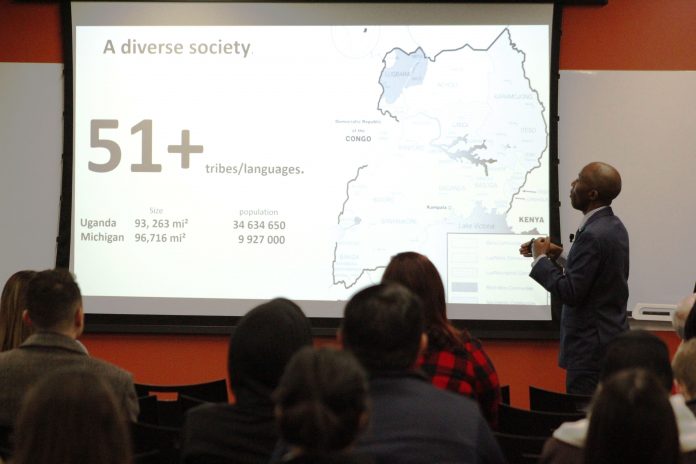
Ellen Terhune
Reporting correspondent
The college concluded its Closing the Global Gap series with a presentation on Uganda Wednesday afternoon in the new Collaboration Center located in the OCB.
The college partnered with the International Relations Council to provide a free opportunity for the public to learn about life in Uganda from those with personal experiences. The goal of the presentation was to address perceptions about the country and provide a different, knowledgeable perspective for the audience.
“I hope in attending the presentation, people can gain a broader perspective of the world we live in and that there really isn’t much that separates us,” said Mary Smith, director of community based learning. “By learning about each other’s cultures and challenges we can work together more efficiently to make our world a better place.”
Johnmary Kirangwa, native and English teacher at Oceir Campion Jesuit College in Northern Uganda, was the first speaker at the event. He is currently pursuing a Master’s Degree in Educational Studies at Rockhurst University. After completing his studies, he plans to return to Uganda to continue working with students at the college.
“I want people in America to get the big picture about Uganda,” Kirangwa said. “Growing up, I lived in different parts of the country, so I have been to the very poor areas and the upscale areas, so I have a balanced view of what life is really like in Uganda.”
Kirangwa explained the lifestyle of a typical Ugandan family, and provided insight on the culture, education and politics as well as the medical care available in the country. He also emphasized that while Uganda is a peaceful place, it is still in the process of rebuilding and establishing itself after 30 years of civil war. Kirangwa believes education is key.
“In third world countries, the level of education is not as good because people have other things to worry about in order to survive,” Kirangwa said. “But the vast amount of knowledge gained through education prepares individual to solve problems, function at a higher level and implement transformational ideas.”
Lacy Gordon, program director for the HALO Foundation, concluded the presentation. The HALO Foundation has seven youth homes in Uganda as well as a learning center aimed at providing housing, healing and education to children who need it the most.
Gordon hoped that the audience would gain more of an interest in Uganda and international relations in general.
“Working together with people that are different from us, in countries that are far away, will benefit everyone,” Gordon said. “We must be more connected to one another.”
Professor Sheryl Hadley said the presentation was a great opportunity for students to learn about the lack of opportunities in third world countries so they could compare it to their lives.
“This gives students a way to look at the rest of the world in a small, intimate learning atmosphere with really unique people,” Hadley said.
For student Nick Urban, Closing the Global Gap served its intended purpose.
“I originally just came for extra credit, but I walked away with information I never knew about Uganda,” Urban said. “When I think of Africa I think of conflict and disease, but now I know Uganda is a beautiful, peaceful place that I would want to visit someday.”





















